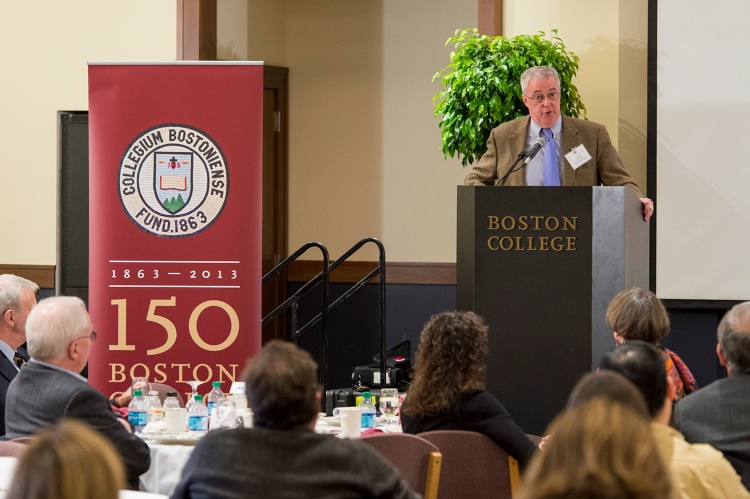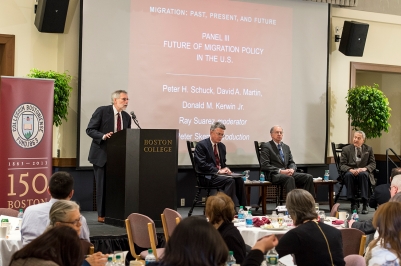
By
Despite the contentiousness that defines the ongoing debate over immigration reform, the current focus on the controversial issue in Washington, DC, and across the country may translate into the best opportunity for effective policy reform, according to a panel of experts at last week’s Sesquicentennial Symposium “Migration: Past, Present and Future.”
The symposium, sponsored by the Center for Human Rights and International Justice, was launched March 21 with a speech by California memoirist Richard Rodriguez and continued the next day with a series of panel discussions and a luncheon address by Clough Millennium Professor of History James M. O’Toole about the role of immigration in the founding of Boston College in 1863.

In addition, at a ceremony presided over by O’Toole’s brother, US District Court Judge George A. O’Toole Jr. ’69, 94 men and women from 42 countries took the oath of allegiance in a federal naturalization ceremony hosted by the Graduate School of Social Work in Robsham Theater. [see separate story]
The scene at Robsham, with the newest Americans waving miniature American flags, beaming at their certificates of naturalization and posing proudly for snapshots with the judge, stood in sharp contrast to the vitriolic debate in Washington and beyond that has defined the latest public and political discussions about how to fix US immigration policy.
Millions of immigration requests are pending in an overwhelmed bureaucracy and politicians from either party are pushing a range of proposals that focus on issues ranging from amnesty to statutory fixes to border security. In the end, it may help to focus on the simplest of questions, according to journalist and PBS NewsHour correspondent Ray Suarez, who moderated the panel “The Future of Migration Policy: Who Is Immigration For?”
Throughout the history of the United States, a nation founded by immigrants, he said, immigration has fulfilled the many roles, loosely grouped into economic and workforce development, political and personal refuge, and family unification across borders. But each of those areas is easily buffeted by forces such as overall global economic health, conflict zones and America’s political environment — all seemingly beyond the reach of the rules and regulations that govern who can enter the US, take up residency or pursue citizenship.
“It’s great to have this conversation now, as we appear to be on the verge of a real donnybrook in deciding what that next phase of immigration law will be,” said Suarez.
Over time, the degree of openness of US borders, even of society itself, has swung between peaks and valleys. Nearly two centuries ago those shifting trends helped to lay the groundwork for BC’s founding, said James O’Toole.
In the 1820s, scarcely 2,000 migrants entered the Port of Boston on a yearly basis. By 1845, the famine in Ireland and political turmoil in Germany had pushed those numbers to 100,000 men, women and children arriving by ship to Boston every year. By the 1850s, Rev. John McElroy, SJ, was at work trying to create a “college for boys of the city” to educate the sons of the newest immigrant generation.
Panelist Peter H. Schuck, professor emeritus at Yale Law School, said America has had a unique immigration experience when viewed with the rest of the world.
“It has been very much a win-win situation for us, but I have to emphasize how extraordinarily rare that has been elsewhere in the world,” said Schuck. “Compared to other countries, the US has always been open to immigration —although not necessarily all immigrants at every point in time.”
Immigration has strengthened families, the economy and the identity of a nation founded by immigrants. The 4.2 million people with pending immigration applications, largely stalled, could be well-served by a careful overhaul of immigration statutes last revised in the 1986, said panelist Donald M. Kerwin Jr., director of the Center for Migration Studies.
He said it would be difficult to ask those individuals to “go to the back of the line” by prioritizing new migrants.
But University of Virginia Law School professor David A. Martin said he did not expect to see the total volume of documented immigrants increase from the current level of 1.1 million people a year.
Still, the compromises and trade-offs required to produce a bill may produce workable reforms, added Schuck. “I don’t think we will see a situation where everybody entirely agrees on this issue. But we may agree enough to muddle through and get some better policies in place than we have now.”



